Basal cell carcinoma is the most common type of skin cancer in the United States. If you are at high risk, it’s important to get screened regularly. AHN is here to help.
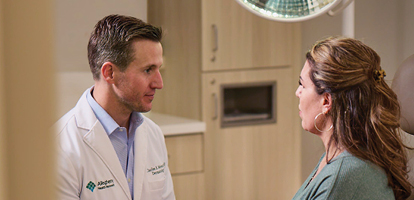
What is basal cell skin cancer?
Basal cell skin cancer (BCC) is a slow-growing cancer that rarely spreads to other parts of the body. It commonly appears on your face, ears, neck, scalp, and shoulders. The first sign of BCC is often a pearly or waxy bump on the skin.
While any cancer diagnosis can be scary, knowing the facts about BCC can help you spot it early and understand the treatment options and disease prognosis. Regular skin checks and having a dermatologist can be a huge help in spotting BCC early. Here are some things to know about BCC:
- Basal cell carcinoma (BCC) is the most common type of skin cancer. It accounts for about 80% of all skin cancers. While it’s usually slow-growing and rarely spreads to other parts of the body, it can be disfiguring if left untreated.
- BCC is primarily caused by sun exposure. The ultraviolet (UV) radiation from the sun damages the DNA in skin cells, leading to the development of BCC. Even having intermittent sunburns throughout your life can increase the risk of BCC. This is why sun protection is crucial for preventing this type of cancer.
- BCC is highly treatable. Early detection and treatment are key. Most basal cell skin cancer is treated surgically. Some cases can be treated with radiation or topical medication, but that is a case-by-case situation, and your doctor will determine what is best for your case.
These are just some key facts. Your AHN dermatologist can help you better understand your risk factors and treatment options.
Skin Cancer Center of Excellence
The AHN Skin Cancer Center of Excellence is at the forefront of delivering state-of-the art treatment for skin cancer and melanoma.
No other skin cancer center in the area has the technology, care, and compassion that AHN provides to its patients.
Why choose AHN for basal cell skin cancer treatment?
At the AHN Cancer Institute, you’re never alone in your diagnosis. Our comprehensive treatment plan, skilled health care professionals, and vast network of resources will help see you through your personalized care plan. At AHN, you will find treatment that is:
- Personalized: Our skilled team of dermatologists, oncologists, pathologists, and surgeons offer the latest targeted, minimally invasive surgeries or therapies pinpointed to treat the type of skin cancer you have. AHN also has dermatopathologists. This is a specialized area of dermatology that specifically treats skin conditions that can arise from cancer treatment.
- Patient-centric: Our Navigation Team helps coordinate appointments, answers questions about symptoms and treatment options, and provides logistical support if you need to travel. We help lift the burden of logistics so you can focus on getting better.
- Compassionate: Cancer treatment is a stressful time. Our compassionate team of caregivers is devoted to improving your quality of life, helping you understand treatment options, and keeping you comfortable every step of the way. Our robust support services help you live the best quality of life during treatment.
- Collaborative: Your treatment team works together to identify the right treatment for you, whether it’s surgery, medical oncology, or radiation therapy.
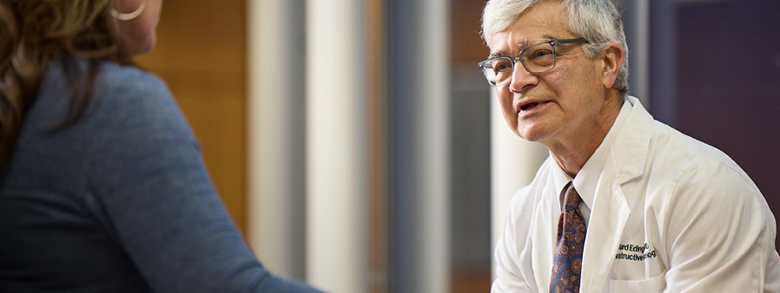
Basal cell skin cancer symptoms
Basal cell skin cancer (BCC) can look like other skin conditions, so it’s important to see a doctor if you have any concerns. Early detection and treatment are crucial for successful treatment. If you notice any of the following symptoms, signs, or changes to your skin, contact your doctor.
- A pearly or waxy bump: This is often the first sign of BCC.
- A flat, flesh-colored or brown scar-like lesion: This can be a sign of a more advanced BCC.
- A sore that heals and then returns: This is a common symptom of BCC, especially on the face.
- A bleeding or scabbing sore: This can be a sign of a more aggressive BCC.
- A shiny, translucent nodule: This is often a sign of a BCC that has grown deeper into the skin.
Basal cell skin cancer causes
Certain risk factors can increase the chance of developing basal cell skin cancer. Talking with your AHN dermatologist about basal cell skin cancer causes and risks can help with early detection.
- Excessive sun exposure: Your risk for developing BCC greatly increases if you have had excessive sun exposure —specifically severe sunburns in childhood.
- Tanning beds and sunlamps: These emit ultraviolet (UV) radiation, which is just as damaging as the sun.
- Fair skin, freckles, and light hair: People with these characteristics are more susceptible to sun damage and BCC.
- Family history of skin cancer: Having a family member with BCC increases your risk.
- Age: BCC is more common in older adults, but it can occur at any age.
- Weakened immune system: People with weakened immune systems, such as those with HIV/AIDS or undergoing organ transplantation, are at higher risk.
- Certain genetic syndromes: Some genetic syndromes, like xeroderma pigmentosum, increase the risk of BCC.
- Exposure to certain chemicals: Exposure to arsenic, coal tar, and some other chemicals can increase the risk of BCC.
Basal cell skin cancer screening and diagnosis
Everyone should get regular skin checks, especially those with a higher risk of BCC. This includes people with fair skin, a family history of skin cancer, and those who have had excessive sun exposure.
The frequency of screenings depends on your individual risk factors. Your doctor can advise you on how often you should get screened. We offer monthly cancer screenings across Pennsylvania. Find AHN cancer screening dates, locations, and eligibility near you.
A new freckle, mole, skin growth or spot can be commonplace, or it can be something more concerning. That’s why it is so important to take note of any new changes and talk with your doctor about what your risk factors are for skin cancer. Early detection is a significant factor in successfully diagnosing and treating basal cell skin cancer.
A physical exam
A physician, often a dermatologist, examines your skin to look for suspicious growths. Basal cell carcinomas tend to look red and flaky. Based on the findings, the physician will talk with you about the next steps.
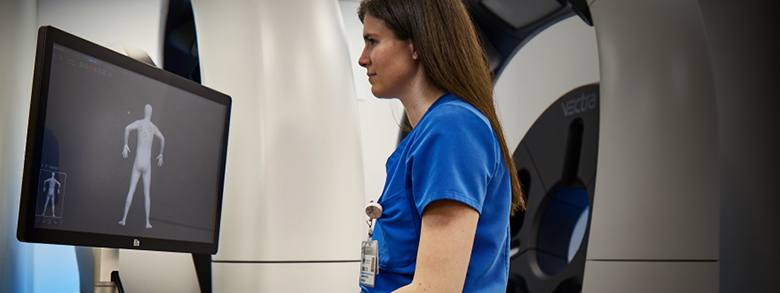
Mole mapping
This procedure uses full-body photographs of your skin to monitor changes in existing moles and to detect new ones. Physicians use this cutting-edge preventive measure at your annual skin exam. It’s especially helpful for tracking moles for high-risk individuals, such as those with a family history of basal cell skin cancer.
Biopsy
A small amount of tissue is removed from your skin for examination under a microscope. A biopsy can determine if cancer is present. During a biopsy, an anesthetic is administered so you will be comfortable.
Biopsy procedures include:
- Shave biopsy, using a tool similar to a razor
- Punch biopsy, using a circular tool that removes a small section of skin
- Excisional biopsy, using a scalpel to remove an entire lump
Types and stages of basal cell skin cancer
Basal cell skin cancer (BCC) can manifest in different ways, leading to various subtypes. Not all BCCs fit neatly into these categories. Some may have features of multiple subtypes. Only a dermatologist can accurately diagnose this type of cancer.
Unlike some other cancers, BCC is not typically staged using the traditional TNM system (Tumor, Node, Metastasis) that’s used in medicine to classify the extent of a cancer diagnosis. Instead, BCC is often described based on its size, depth of invasion, and location.
Nodular basal cell carcinoma
This is the most common type, appearing as a pearly or waxy bump, often with a central depression. It can be flesh-colored, brown, or black. It can be larger and more raised than superficial BCC and tends to grow slowly and may bleed easily. Treatment may require more extensive surgery or radiation therapy.
Superficial basal cell carcinoma
Appearing as a flat, scaly, or crusted patch, often with a slightly raised border, superficial basal cell carcinoma can be flesh-colored, brown, or pink. It spreads horizontally across the skin, but rarely grows deep. While it is still often treated surgically, topicals are only used rarely and your doctor will determine what is best for your treatment.
Pigmented basal cell carcinoma
Sometimes mistaken for melanoma, pigmented basal cell carcinoma can be mistaken for melanoma due to its dark pigmentation. It can appear as a brown, black, or blue-black nodule or patch. It grows slowly and may be more difficult to diagnose than other types.

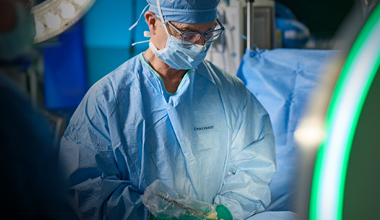


Infiltrating basal cell carcinoma
This type is more aggressive and can grow deeper into the skin. It may appear as a scar-like lesion, a sore that doesn’t heal, or a firm, raised nodule. It can spread to nearby tissues and may require more extensive treatment. Treatment may require more extensive surgery, radiation therapy, or other treatments.
Morpheaform basal cell carcinoma
Appearing as a scar-like, white, or waxy growth, morpheaform basal cell carcinoma can spread slowly and may be difficult to remove completely. It can be difficult to diagnose and may require multiple treatments.
Micronodular basal cell carcinoma
This type appears as small, pearly nodules that are often clustered together. It can spread quickly and may require more extensive treatment.
Basal cell carcinoma with a “rodent ulcer” appearance
Known for its characteristic “rodent ulcer” appearance, meaning there is a central red/pink color crater surrounded by a raised, pearly border this type can be aggressive and may require more extensive treatment.
Recurrent basal cell carcinoma
Sometimes BCC can return after treatment and is known as recurrent basal cell carcinoma. When this happens, more aggressive treatment options are necessary.
Basal cell skin cancer treatment
Your AHN dermatologist will recommend the best treatment option for you based on your individual situation and skin cancer type. It’s important to discuss the risks and benefits of each treatment option with your doctor.
- Local excision: This refers to the tissue surrounding a tumor that is removed during surgery. BCC often requires smaller surgical margins — meaning less tissue is removed — due to its slower growth and lower risk of metastasis.
- Mohs surgery: This surgery is a specialized technique used to remove certain skin cancers and is best used in certain situations. While both BCC and squamous cell carcinoma (SCC) can be treated with Mohs surgery, it is more commonly used for SCC due to its higher risk of recurrence.
- Radiation therapy: Radiation therapy is more frequently used for SCC than BCC, especially for advanced or recurrent tumors.
- Chemotherapy: Chemotherapy is rarely used for BCC but may be necessary for advanced SCC.
Surgery
Skin cancer surgery takes precision and care. AHN surgeons use only the latest, most advanced, and minimally invasive surgical techniques to remove and treat the affected area. Some of the procedures that are used include:
- Local excision surgery: The surgeon removes the BCC and a margin of healthy tissue around it to reduce the risk of recurrence. It’s a common option for smaller BCC diagnoses.
- Electrodesiccation and curettage: This involves scraping away the BCC with a curette and then destroying any remaining cells with an electric current. It’s often used for smaller BCC cases.
- Mohs micrographic surgery: A highly precise technique involves removing the BCC layer by layer and examining each layer under a microscope to ensure complete removal. It’s often used for BCCs on the face or other sensitive areas.
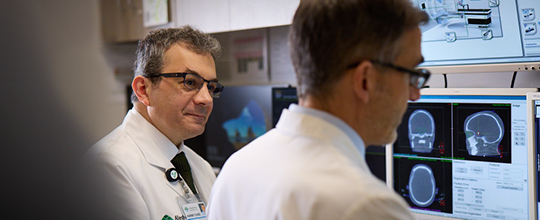
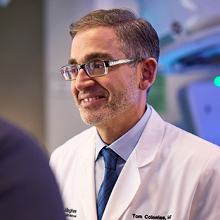

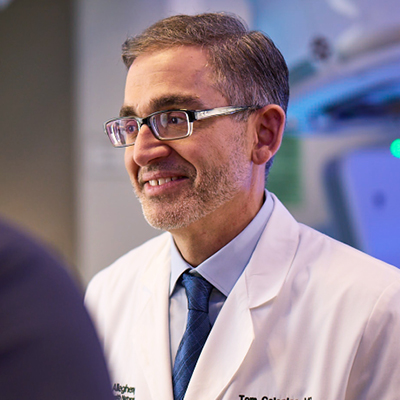
Radiation therapy
Radiation is another option when surgery isn’t feasible for large tumors or with those who are not good candidates for surgery. Your AHN care team can discuss what radiation therapy would mean for you and your specific diagnosis.
Radiation therapy options for this basal cell skin cancer includes:
- External beam radiation therapy: Using high-energy X-rays to destroy the BCC cells, it’s often used for BCCs that are difficult to remove surgically or for patients who are not good candidates for surgery.
- Brachytherapy: This involves placing radioactive seeds or pellets near the BCC. It’s often used for BCCs on the eyelids or other sensitive areas.
Topical medications
Topical medications are used as a noninvasive treatment approach. Topicals can be effective in treating superficial BCC that has not gone deeper than the top layer of skin. It may also be the next option for patients who are not candidates for surgery.
Medication options include:
- Imiquimod (Aldara): A cream to stimulate the immune system to fight the BCC cells. It’s often used for superficial BCCs.
- 5-Fluorouracil (5-FU): This cream is a chemotherapy drug that destroys the BCC cells. It’s often used for superficial BCCs.
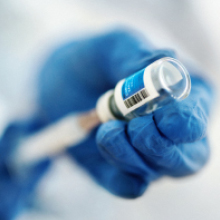
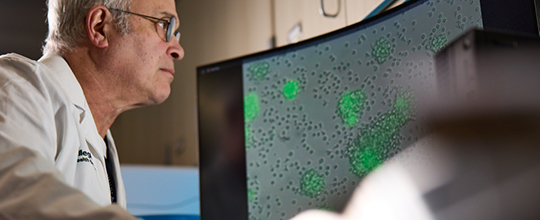
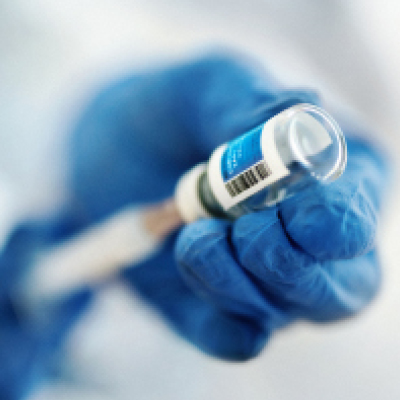

Cryosurgery
In some cases, cryosurgery is effective in freezing the superficial BCC with liquid nitrogen. It is often used for smaller cases of BCC.
Targeted therapy
Targeted therapies include hedgehog inhibitors for BCC in cases that are not treated surgically. Often targeted therapies are used for locally advanced BCC where the patient is not a candidate for surgery.
Basal cell skin cancer FAQs
A skin cancer diagnosis, including basal cell carcinoma, often brings a wave of emotions and questions. At AHN, our dedicated team is here to provide clarity and develop a personalized treatment plan. To help navigate this information, these frequently asked questions can serve as a valuable resource, assisting you in formulating your own questions for your care team.
How serious is basal cell carcinoma skin cancer?
Basal cell carcinoma (BCC) is generally considered the least serious type of skin cancer because it rarely spreads to other parts of the body (metastasizes) and is almost always curable when detected and treated early. However, if left untreated, BCC can grow larger, invade deeply into local tissues, and cause significant disfigurement, especially if located on the face, head, or neck. While not typically life-threatening, it can be destructive to surrounding tissue.
How aggressive is basal cell skin cancer?
Basal cell skin cancer (BCC) is generally considered to be a slow-growing and non-aggressive cancer. It rarely metastasizes. However, some types of BCC, such as infiltrative, morpheaform, or micronodular BCC, can be more aggressive locally, growing deeper and wider into the skin in an irregular pattern, making them more challenging to remove completely and increasing the risk of recurrence if not fully treated.
What is the survival rate for basal cell skin cancer?
The survival rate for basal cell skin cancer (BCC) is exceptionally high, particularly when it is detected and treated early. For localized BCC, the cure rate is often cited as 99% or higher with appropriate treatment. Because BCC rarely spreads (metastasizes), the overall survival rate is excellent. Even in rare cases of metastatic BCC, treatments can extend life, but the prognosis is significantly altered.
Can basal cell skin cancer spread?
While it is extremely rare, basal cell skin cancer (BCC) can spread (metastasize). When it does spread, it typically goes to regional lymph nodes first, and then, very rarely, to distant organs like the lungs, bones, or liver. Metastasis is estimated to occur in less than 0.1% of all BCC cases. Factors that increase the risk of spread include very large or deeply invasive tumors, recurrent tumors, tumors in certain high-risk locations, or in immunocompromised individuals.
What does basal cell carcinoma skin cancer look like?
Basal cell carcinoma (BCC) can appear in several ways, and its appearance can vary:
- Pearly or waxy bump: Often translucent, sometimes with visible blood vessels (telangiectasias). It may look like a flesh-colored or pink bump.
- Open sore: A sore that bleeds, oozes, or crusts and doesn't heal, or heals and then reappears.
- Reddish patch or irritated area: Often found on the chest, back, arms, or legs, which may crust, itch, or bleed.
- Pink growth: With a slightly raised, rolled border and a crusted indentation in the center.
- Scar-like area: A flat, firm, pale, or yellow area with poorly defined borders, which can indicate an aggressive type of BCC. BCCs most commonly appear on sun-exposed areas of the body, such as the face, neck, ears, scalp, shoulders, and back.
Is basal cell skin cancer fast growing?
No, basal cell skin cancer (BCC) is generally not considered fast-growing. It typically grows slowly over months or even years. However, the growth rate can vary, and some subtypes or BCCs in certain individuals might grow somewhat faster. Even with slow growth, untreated BCC can progressively enlarge and become more destructive to local tissues.
Is basal cell skin cancer ever fatal?
While extremely rare, basal cell skin cancer (BCC) can be fatal, primarily if it is neglected for an extended period, leading to massive local tissue destruction or if it metastasizes. However, the vast majority of BCCs are curable, and fatalities are almost exclusively associated with very advanced, deeply invasive, or metastatic cases that were not treated or were resistant to treatment.
Can basal cell skin cancer be removed?
Yes, basal cell skin cancer (BCC) can almost always be removed or treated effectively. There are several treatment options available, and the choice depends on the size, location, and type of the BCC, as well as the patient's health. Common treatments include:
- Surgical excision: Cutting out the cancer and a margin of healthy tissue.
- Mohs surgery: A precise surgical technique that removes layers of cancer cells one by one until no cancer remains, preserving healthy tissue. This is often used for BCCs on the face or those that are large or recurrent.
- Curettage and electrodessication: Scraping away the cancer and burning the base with an electric needle.
- Radiation therapy: Using high-energy beams to kill cancer cells.
- Topical medications: Creams like imiquimod or 5-fluorouracil for superficial BCCs.
- Photodynamic therapy: Using a drug activated by light to kill cancer cells.
- Oral medications: For very advanced or metastatic BCCs.
What can be mistaken for basal cell skin cancer?
Just like with squamous cell carcinoma, several skin conditions can be mistaken for basal cell carcinoma (BCC) due to similar appearances. This is why a proper diagnosis by a dermatologist, often involving a biopsy, is crucial. Some conditions that can be mistaken for BCC include:
- Benign Moles (Nevi): While moles are usually uniformly pigmented, some atypical moles or moles that have been irritated can resemble BCC, especially if they are raised or have an irregular border.
- Seborrheic Keratoses: These are common, benign skin growths that often appear waxy, scaly, or slightly raised. They can be black, brown, or light tan. Some can have a pearly or slightly irritated appearance that might be confused with BCC.
- Actinic Keratoses: These are precancerous lesions that appear as rough, scaly patches on sun-damaged skin. While they are more directly linked to squamous cell carcinoma, some can have an inflamed or irritated appearance that might prompt suspicion of BCC.
- Psoriasis or eczema: These inflammatory skin conditions can cause red, scaly, or irritated patches that, in some presentations, might be confused with a superficial BCC, especially if it's a chronic, non-healing patch.
- Warts: Viral warts can sometimes have a rough, raised, or pearly appearance, similar to some nodular BCCs.
- Scars (especially from trauma or acne): A healing wound or a persistent scar can sometimes have a shiny or irregular texture that might be initially concerning, particularly if it's on the face.
- Adnexal tumors: These are benign tumors that arise from skin appendages like hair follicles or sweat glands. Some can present as small, skin-colored or pearly bumps that might be confused with BCC.
- Keratoacanthoma: While often more rapidly growing and with a central crater, some early keratoacanthomas can resemble nodular BCCs.
- Squamous cell carcinoma (SCC): While distinct, some SCCs, especially early or superficial ones, can occasionally have a similar appearance to BCC, particularly if they are reddish, scaly, or nodular.
Call the Hope Line at 412-578-HOPE 412-578-4673 to connect with a nurse navigator or schedule an appointment.

